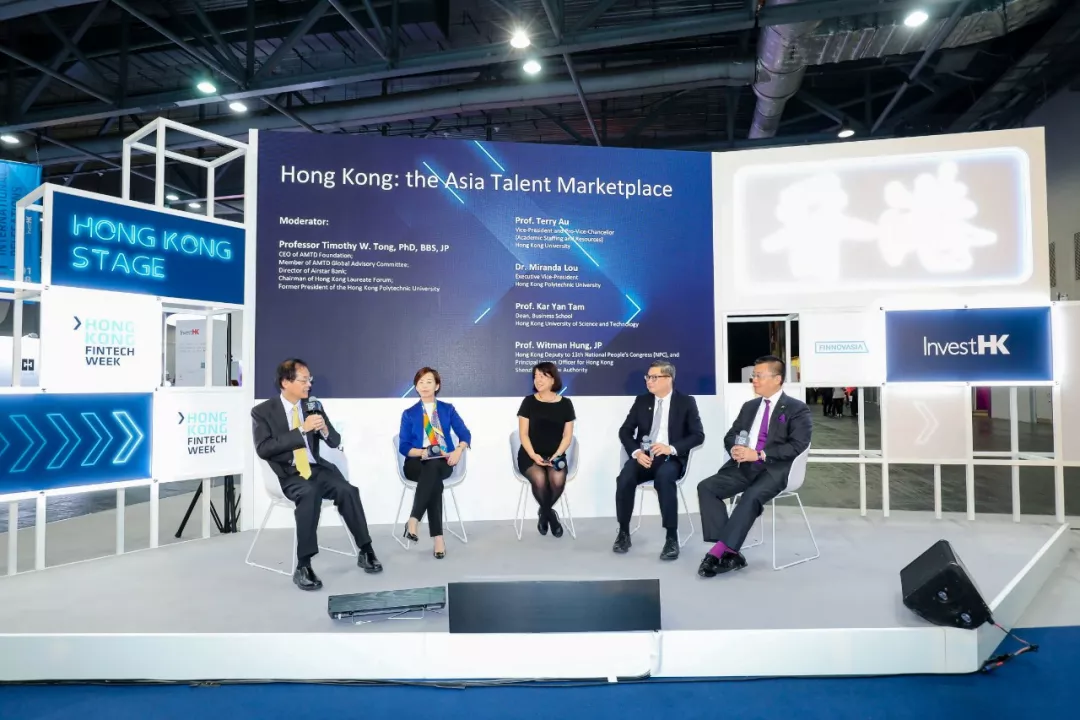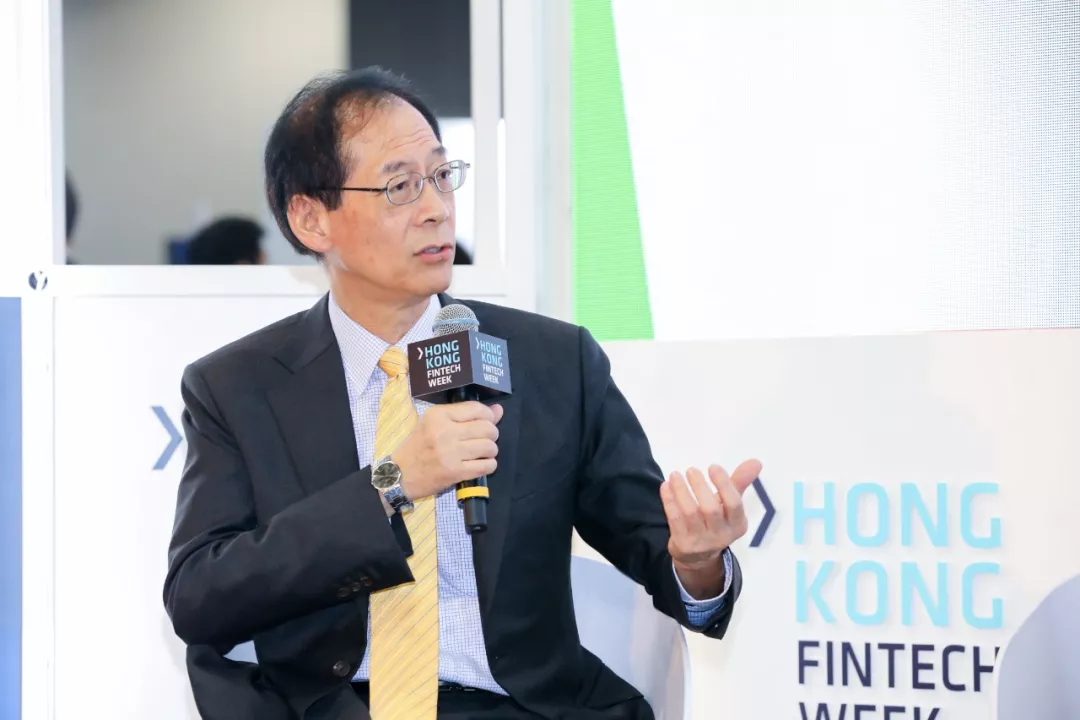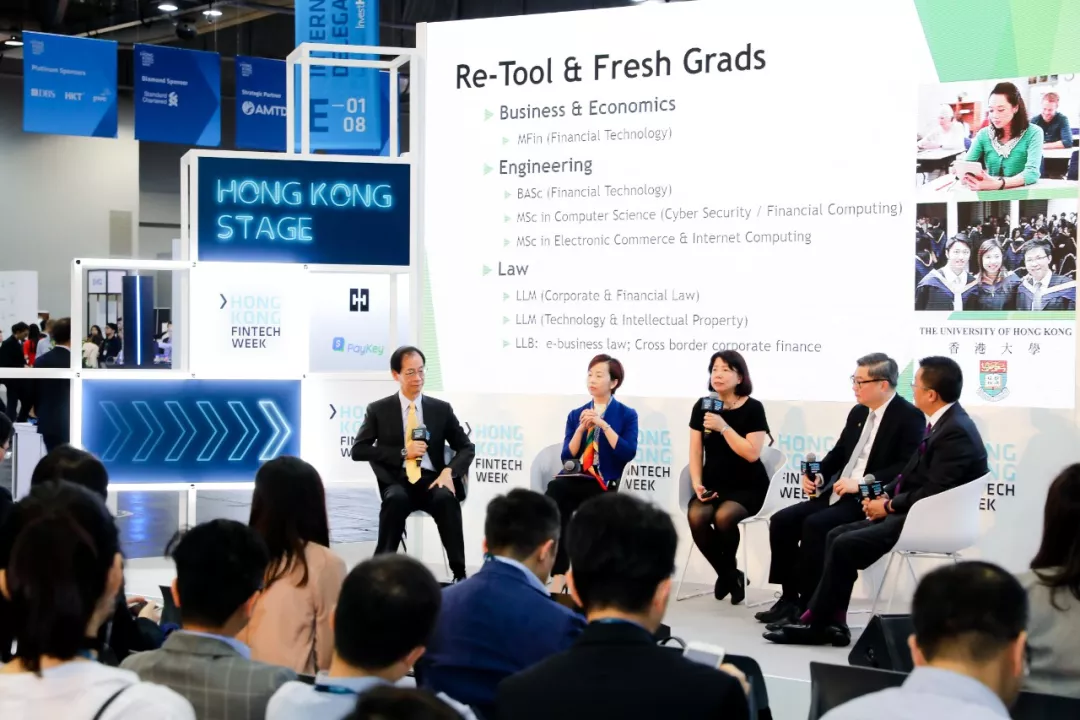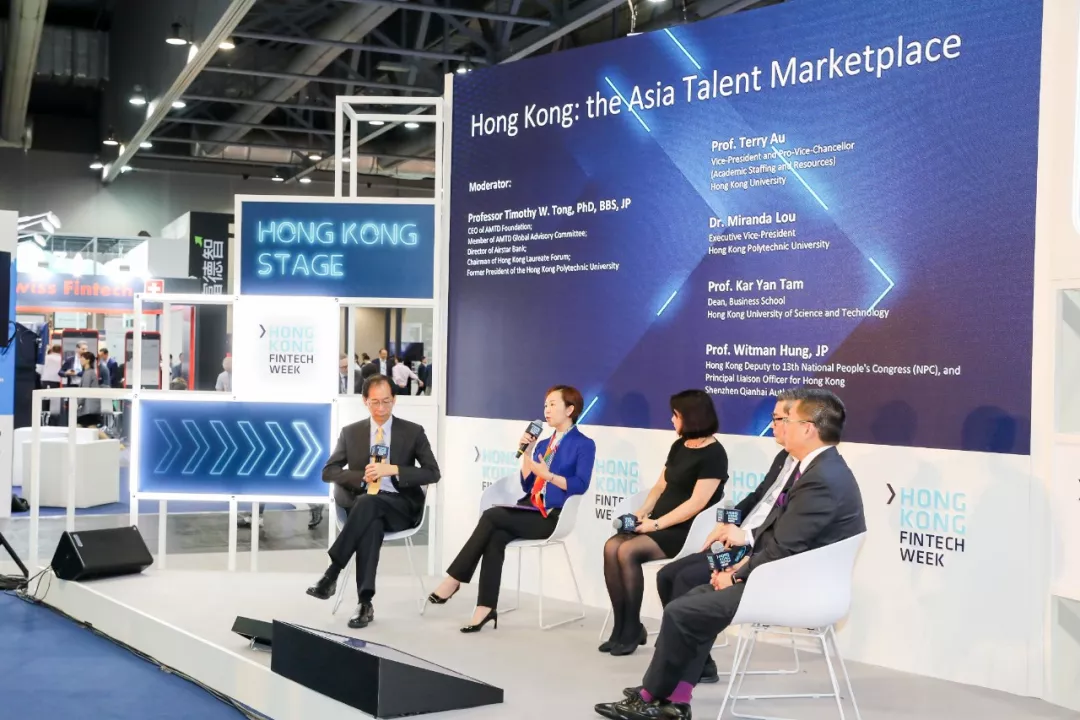Hong Kong Fintech Week
Organized by InvestHK, a HKSAR government department, supported by the Hong Kong Monetary Authority (HKMA), the Securities and Futures Commission (SFC), the Insurance Authority (IA) and the Hong Kong Stock Exchange (HKEX), and with AMTD Group as the sole strategic partner, Hong Kong Fintech Week 2019 took place from November 4th to 8th in Hong Kong and Shenzhen. This is the second year in a row that AMTD Group serves as a sole strategic partner for Hong Kong Fintech Week.
At the Hong Kong Stage of Fintech Week on the afternoon of November 6th, Professor Timothy W. Tong, who is the Chief Executive Officer of AMTD Foundation, member of the National Committee of the Chinese People’s Political Consultative Conference, Chairman of Hong Kong Laurel Forum, Director of Airstar Bank and Former President of Hong Kong Polytechnic University, presided over a round table discussion entitled “Hong Kong: the Challenges of Asian Talent Centers and Corresponding Countermeasures”. In this seminar, the participants summarized and discussed the current situation of increasing demand for professional talents under the trend of fintech development and how Hong Kong should cope with this trend so as to cultivate and attract talents. Specifically, the guests participating in the discussion included Professor Terry Au Kit-fong, the Vice-Chancellor of the University of Hong Kong (Academic Staffing and Resources); Dr. Miranda Lou, the Executive Vice President of Hong Kong Polytechnic University; Professor Tam Kar Yan, the Dean of Business School of Hong Kong University of Science and Technology; Professor Hung Witman, the Principal Liaison Officer for Hong Kong Qianhai Authority and the Representative of the National People’s Congress.

Professor Timothy W. Tong pointed out that the fintech will not only reshape the entire financial industry in a few years, but also will bring challenges and opportunities to Hong Kong. In essence, the development of fintech requires a large number of talents. Therefore, how to attract and cultivate talents is a particularly noteworthy issue.

Professor Terry Au Kit-fong shared the efforts of the University of Hong Kong in attracting talents, especially in the field of fintech. In particular, the experience of the University of Hong Kong is to provide a platform for young talents to share and exchange ideas through holding high-quality forums and seminars. On the one hand, it can enable teachers and students of the University to understand the most advanced academic viewpoints, and on the other hand, it can also enable young people to gain more knowledge about the University of Hong Kong and be attracted to work in the university. Additionally, the University of Hong Kong has also set up special projects in the field of fintech and encourage people in the industry to return to the campus to learn more knowledge to improve themselves, in order to make them better integrate into the trend of fintech development.

Dr. Miranda Lou mentioned that one of the great innovations of the Hong Kong Polytechnic University in the field of fintech is to establish a cooperative relationship with AMTD and set up the first school-enterprise cooperation fintech center in Hong Kong, namely, “AMTD Institute of Fintech”. AMTD is a leading financial institution in the world, while Hong Kong Polytechnic University has made outstanding achievements in cultivating talents and carrying out scientific research and innovation. Consequently, the fintech center jointly established by the two, which combines the advantages of both parties, will certainly realize their common vision of promoting Hong Kong to become a leading international fintech center. More importantly, AMTD Institute of Fintech will devote itself to the research of fintech and provide fintech consultants and special training services to the industry in an attempt to support fintech start-ups and promote exchanges and cooperation among fintech professionals in Hong Kong, mainland China and around the world. Meanwhile, “AMTD Institute of Fintech” will also organize high-quality fintech education and corresponding training for students and the financial industry as well as the public.

Professor Tam Kar Yan proposed that the Hong Kong University of Science and Technology has made great efforts to cultivate talents in Asia and Hong Kong. Taking the newly established master of finance science and technology program as an example, it is jointly operated by the institute of business administration, the institute of technology and the institute of science. With the goal of improving traditional financial services by using new technologies and financial innovations, it is positioned as a new multi-disciplinary and multi-field project. As one of the few famous universities that have established master’s programs in fintech in Hong Kong and mainland universities, Hong Kong University of Science and Technology will cultivate a large number of fintech talents. Moreover, Professor Tam also shared some experiences on how to combine finance with science and technology in practical teaching. For example, business schools will cooperate with people in the industry to offer courses in the field of fintech in their daily teaching, which can facilitate students applying theory for practice, but also enable them to learn the most advanced knowledge in the field of fintech.
Professor Hung Witman introduced the huge talent gap caused by the increasing demand for talents brought about by the development of the China Great Bay Area. Specifically, in the field of fintech, the supply to demand ratio of talent is concentrated between 10% and 30%. Although a large number of talents gathered in Shenzhen and its surrounding areas have been continuously deployed to the China Great Bay Area, these talents need to have an international perspective as well as an understanding of regulatory policies and economic and financial knowledge when entering the fintech field. There is no doubt that internationalized talents are the most lacking in the field of fintech. Moreover, one of the important reasons for the shortage of talents is that most people choose to enter the financial field instead of the scientific and technological field. However, we can still see that the government is making continuous efforts to promote the training of scientific and technological talents. When talking about the types of talents needed in the development of fintech in the China Great Bay Area, Professor Hung pointed out that although more and more talents are flowing into the China Great Bay Area from other regions, most of them are mainland talents. The China Great Bay Area may need more international talents. The key is that we need to build the connection between finance and technology to attract more people in joining the field of finance and technology.


